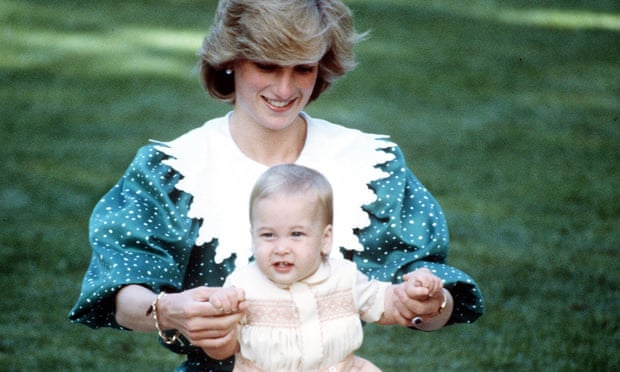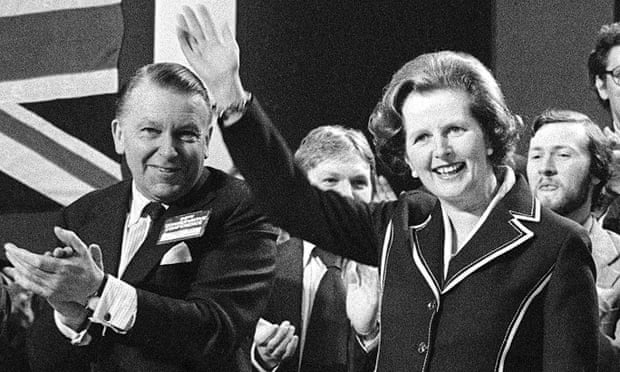Newly released files show PM’s press chief suggested releasing footage of royal baby to keep CND protests out of the news
 Princess Diana with Prince William in 1983, a time of growing opposition to the deployment of US cruise missiles in UK. Photograph: Anwar Hussein/WireImage
Princess Diana with Prince William in 1983, a time of growing opposition to the deployment of US cruise missiles in UK. Photograph: Anwar Hussein/WireImage
Margaret Thatcher was privately warned by foreign secretary Francis Pym in 1983 that the anti-nuclear movement could become so “widespread and powerful” that it might halt the deployment of US cruise missiles in Britain.
Newly released Downing Street files also show that Thatcher’s press secretary, Bernard Ingham, recommended the release of official footage of royal baby Prince William over the 1983 Easter bank holiday weekend, in order to knock Campaign for Nuclear Disarmament protests out of the news headlines.
(INSERT, Sandra: Too bad that the people fighting against Nuclear weapons didn’t know their effectiveness at the time. The story is important now, to empower us.
There are links to related articles, Guardian URL:
Ingham recommended using footage of the prince with his parents, Charles and Diana, to bury coverage of the anti-nuclear protests after admitting that alternatives such as an “assassination attempt on the Pope” or a “North Sea blow out” were in the “lap of the gods”.
The latest batch of files released by the National Archives in Kew show that concern over the deployment of US nuclear cruise missiles in Britain went far beyond the ranks of CND and the Greenham Common women to include at least one of Thatcher’s closest advisers.
Sir Anthony Parsons, a former ambassador who advised Thatcher after his retirement, told her that he was “astonished” at the “wide spectrum of personal friends” who were “actual or potential supporters of the government” and were preoccupied with the nuclear debate. He said one reason for their concern was the presence in the White House of Ronald Reagan, a president “of lower intellectual calibre and less grasp of international issues than any incumbent since the second world war”.
The Downing Street files also include a later MI5 report on a claim by John Major, Thatcher’s successor at No 10, that CND was trying to buy up properties on the edge of one of the bases where the cruise missiles had been deployed.
But Pym’s official assessment of the impact of the anti-nuclear movement in the 1980s shows that the mass protests came closer to halting the deployment of US missiles than many assumed at the time.
In a “personal and confidential” note in January 1983, Pym told Thatcher that it would prove a crucial year in the nuclear weapons debate, with 144 US cruise missiles to be deployed in November at bases at Greenham Common, Berkshire, and Molesworth, Cambridgeshire.

Pym warned that an “energetic and outright attack on the peace movement”, which had been attracting hundreds of thousands of people to its demonstrations, might “hearten the faithful, but it does little to persuade the doubters”. He said that thousands of people were entering active politics for the first time through the peace movement.
Pym wrote:
“The risk is two-fold: a. the development of a mass movement of demonstrations and civil disobedience against Cruise in 1983 so widespread and powerful that deployment would actually become difficult or even impossible. I still would not rate this possibility very highly, but it is less inconceivable than it was six months ago.
“b. an intensification of public opinion against nuclear weapons so strong that large numbers determine their vote on this issue in favour of the Labour or Liberal parties at the general election.”
Pym urged Thatcher to launch a sustained publicity campaign. She agreed and asked her new defence secretary, Michael Heseltine, to undertake the role. But she rejected one Pym suggestion that she chair a roundtable conference of senior members of the clergy including the archbishops, the cardinal and the moderator. “Fatal – I would have thought,” she noted in response to the idea.
However, Heseltine took to his task with gusto. He made plans to be filmed at the Berlin Wall over the 1983 Easter bank holiday weekend, when CND was planning a 14-mile (23km) human chain linking the nuclear warhead factories at Aldermaston and Burghfield to Greenham Common.
Ingham was not overjoyed by Heseltine’s plan, saying he had “serious doubts about ministers being seen to be competing with CND on Good Friday, the day of Christ’s crucifixion”.
The press secretary said they needed to consider “whether there was anything useful we can do to neutralise the television appeal of these demonstrations. They will secure less airtime and have less impact if something more newsworthy in television terms occurs – eg (to be brutal) a North Sea blow out; an assassination attempt on the Pope, etc; some awful tragedy.”
On 17 March 1983, Ingham told a Downing Street meeting: “I think that Good Friday is a lost cause. This is the day when the CND chain will (or will not) be formed between Aldermaston and Greenham Common. It is also a day when there is not much sport. However, what would take the trick would be press and TV pictures, for the release on the evening of Good Friday and/or Saturday newspapers of Prince William in Australia.”
His proposal was recorded in the minutes as an official recommendation. But although the media did report that 70,000 people took part in CND’s “human chain” protest, no pictures of Prince William on tour in Australia with his parents seem to have appeared that Easter weekend.